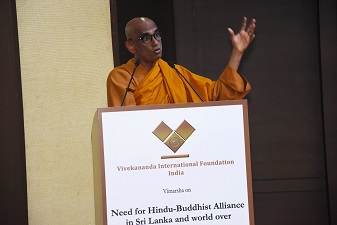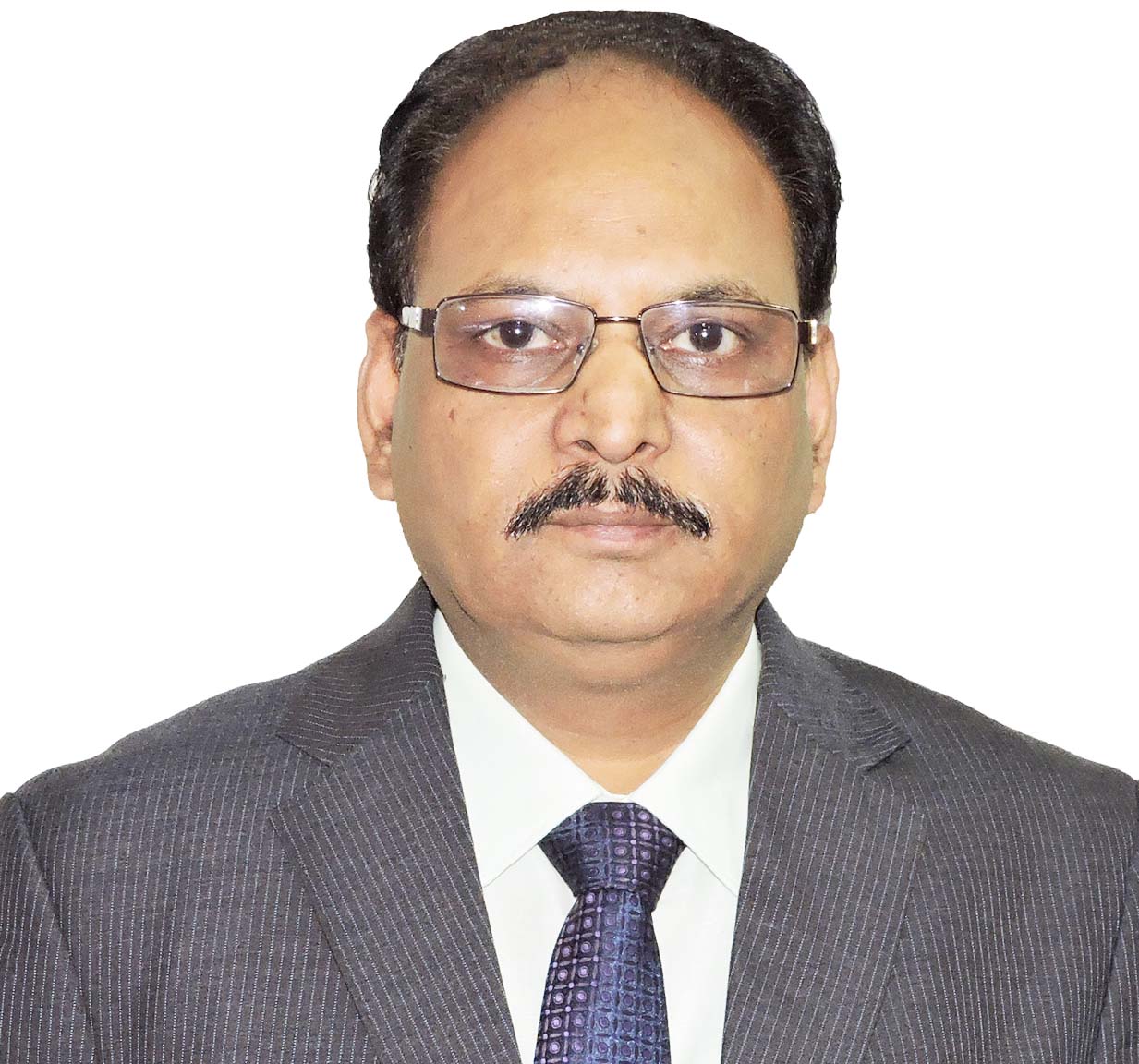In the run-up to the ‘SAMVAD-III: Global Hindu Buddhist Initiative on Conflict Avoidance and Environment Consciousness’, which will be held from 6th to 8th September 2019 at Ulaanbaatar, Mongolia, the VIF held its monthly Vimarsha on 22 August 2019. Two prominent speakers were, Ven Athuraliye Rathana Thero, a renowned Buddhist monk and Member of Parliament from Sri Lanka, and Sri S Gurumurthy, a Member to the Board of the Reserve Bank of India (RBI) and Chairman of the Board of Trustees, VIF, speaking about the ‘Need for Hindu Buddhist Alliance in Sri Lanka and World over’. The audience comprised of people from diverse backgrounds – retired bureaucrats, former diplomats, military veterans, students, and media personnel, among others. Incidentally, Vimarsha remains by far the most popular of VIF’s public events and has been going on uninterrupted for almost a decade.
Of the two key speakers, Ven Rathana Thero is a highly acclaimed Buddhist monk in Sri Lanka and a Member of Parliament with thirteen years of continuous experience. He played a pivotal role in toppling the UNP government in 1994 and also launched a national movement against terrorism in 1997 leading to the eventual defeat of the LTTE in subsequent years. Rathana Thero has also written a book, titled, Buddha in You, which explicitly explains the core concept of Buddha Dharma. Sri S Gurumurthy, on the other hand, has been an ardent votary of Swadeshi movement in India and is currently the Co-Convener of Swadeshi Jagran Manch. Besides being a member to the board of RBI and Chairman of the VIF, he is also the editor of Tamil weekly Tughlaq and writes profusely on issues of critical importance before the nation from a nationalist’s perspective. He is a charismatic orator.
Dr. Arvind Gupta, Director VIF, kicked off the session with a brief introductory speech underlining the relevance of philosophies of the Hindu and Buddhist religions, particularly significant in an age marred by religious intolerance and violent extremism. He expressed satisfaction over the fact that the VIF’s initiative for SAMVAD, i.e Global Hindu Buddhist Initiative on Conflict Avoidance and Environment has picked up the required momentum, especially after it found mention in the joint statement of Prime Ministers of India and Japan, Sri Narendra Modi and Shinzo Abe, in September 2017. Dr Gupta stressed on the fact that Hindu and Buddhist religions have not only great regards for one another but are also complementary in nature. Both espouse the concept of peace, ahimsa, conflict avoidance and environmental consciousness. Both are tolerant religions, accommodating diversities, supporting harmony among diversity and harmony between men and nature.
In his keynote address, Ven Athuraliye Rathana Thero stressed the need for mankind to find new pathways, especially keeping in view the fact that while on one hand, mankind has made tremendous progress in science and technology, resulting in what he described as a ‘magical era’ for the mankind, on the other hand, violence, hunger, diseases, malnutrition, besides a host of other problems still persist on a gigantic scale. According to Rathana Thero, what the world really needs to lift itself from the impending crisis is ‘spiritual guidance’ which can come only from India. There are many streams of spiritual thoughts in Hindu religion which are yet to find the mainstream. The Hindu religion is not a monolith; as compared to many other religions, it allows the worship of God in many different forms, which is why the Hindu religion is a tolerant religion. It is adaptable to the extent that it has absorbed many practices from alterative faiths, vegetarianism being one such practice which has come from Jainism. Ven Rathana Thero also suggested that one can see Buddhism in Hinduism.
Speaking of Swami Vivekananda, Rathana Thero described him as a modern saint of Hinduism whose philosophy has resonated the world over. The illustrious Buddhist monk also felt the need for a new spiritual leader who is competent in constructing Vivekananda philosophies into the modern Hindu trend. He further added, “Even in Buddhist tradition, we need new Buddha, for a new era, who can touch and unify both Buddhist and Vivekananda ideologies in a new spiritual force. This can only be accomplished, with the gathering of honest and unselfish individuals who are not overpowered by wealth”.
Sri S Gurumurthy, who spoke after Ven Rathana Thero, brilliantly brought out how Buddhism and Hinduism differed from other religions. He said, people across all religions are the same but all religions are not the same. All religious people cutting across all religions have the same tendencies for violence, greed, jealousy etc., but Hinduism and Buddhism are the only two religions which have taught people resistance against such tendencies. Discussing the history of human slaughtering around the world, he said, India was an exception to such activities and Buddhist and Hindu traditions moderated the normal quarrelsome, violent and intolerant attitudes of human beings, making them develop a tendency to accept all the Gods, within as well as outside. He also said that the reason behind peace in India is due to the fact that Hindus have accepted thousands of Gods.
Sri Gurumurthy further continued, there is an element in Tarka Shastra, called Purva paksha which is singularly the most important contribution by the Hindu Buddhist civilization to the world, where religious scholars discuss about each other’s spiritual or religious traditions after studying the other view point. There is a space for critiquing and debating about the other’s view points and traditions with tolerance towards the opposing views. Purva paksha, as evolved in the highest Hindu-Buddhist traditions lay the foundation for inter-religious dialogues and was practiced in the highest forms. He also highlighted that Sri Lanka, being a small country and recently devastated by acts of terror, needs this kind of a dialogue more than India does. He felt, it was the definite responsibility of the Hindu Buddhist civilisations to promote an honest and open debate amongst followers of all religions. Both the speakers engaged the audience in an enthralling Q&A session following their speeches.







Post new comment